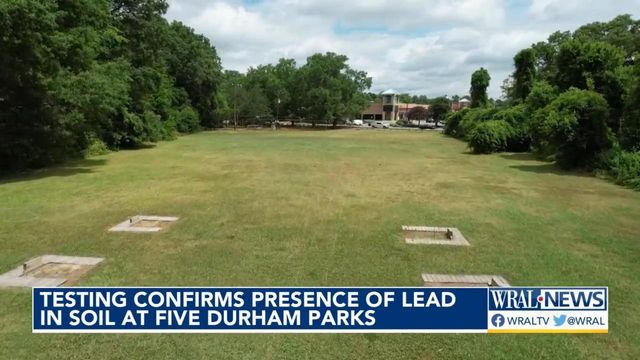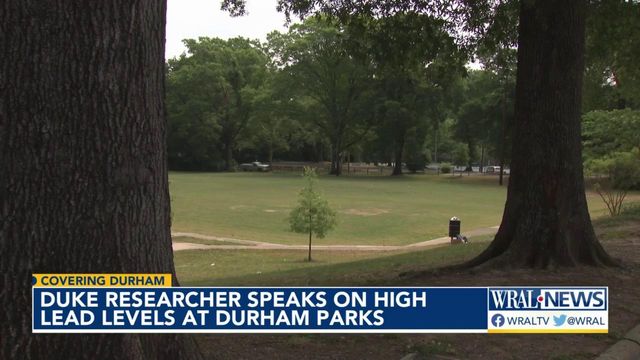Duke student finds lead in soil at 3 Durham parks, suspects contamination at 2 others
A neighborhood association is looking into what's next after a Duke student researcher found "alarmingly high" levels of lead in the soil of three Durham parks.
Several parents who spoke with WRAL News had no idea of the findings and said they wish the city did more to let parents know.
In December 2022, a report from Duke student Enikoe Bihari concluded there were mineral soil concentrations of lead in some areas of East End Park, East Durham Park and Walltown Park. Lead is suspected at Northgate Park and Lyon Park.
The report only recently came into the public eye.

Bihari's thesis also indicates she suspects lead is in two other parks, but she did not have time to test them.
During a meeting on Monday night, Duke soil scientist Dan Richter said out of the three parks tested, East Durham Park had the highest amount of lead findings.
"Every sample we take is disturbing," Richter said. More than 100 took part in the discussion.
A city spokesperson said, in a statement, the city will do additional testing. A city sponsor said the manager sent that statement to the Walltown neighborhood association leaders.
Some people feel like that is not nearly far enough to spread the word. WRAL went by all three parks today and spoke with parents who had no idea. They would like to see some kind of signage at the parks alerting people.
"Even at low levels of exposure, lead can cause dire health issues, ranging from cardiovascular stress to neurological damage," Bihari wrote.
"It's disheartening," said youth football coach Fred Evans. "You feel like someone had to know something ahead of this, give people warning."
Evans coaches in a football league at one of the affected parks multiple times a week and worries for the kids. He was previously unaware of the findings.
Audrey Mitchell is worried, too.
"Without the resources that most organizations have, we can't just pop up and move anywhere," Evans said.
Mitchell is the president of the Walltown Community Association and grew up playing in every corner of its park.
"I'm concerned about my health for one thing," Mitchell said. "Has it affected me?"
The Duke student explained the likely source of the lead. The three parks used to be incinerator sites, where trash was burned. She recommended testing at at Northgate Park and Lyon Park, where she believes contamination is likely, as the parks have similar histories.
She said the city had done no tests prior to her study. Bihari is in the environmental management and forestry programs at Duke.
Durham City Manager Wanda Page said in a statement that the city will test all five parks and will work with public health officials on education for the surrounding communities.
Levels higher than the EPA standard
Mercedes Bravo, Assistant Research Professor of Global Health with Duke University, said parents should be concerned with the amount of lead in soil in the affected parks.
"The levels of lead found in the soil are well above the EPA standard," Bravo explained, adding that lead exposure can be particularly harmful to the health of children.
According to the Center for Disease Control, children can accidentally come into contact with lead in soil in numerous ways, including:
- Swallowing or breathing in lead-contaminated soil while playing
- Contaminated soil particles can be brought inside as lead dust or on shoes, clothing or pets.
- Putting their hands, which may have been contaminated with lead dust from the soil, into their mouths.
- By eating soil, or by eating fruits and vegetables that were grown in or near lead contaminated soil.
Lead poisoning can cause numerous health problems, including:
- Damage to the brain and nervous system.
- Slowed learning and development
- Learning and behavioral problems
- Hearing and speech problems
Those health problems can lead to lower IQ, decreased ability to pay attention and underperformance in school.
What to do if you think your child has been exposed
Lead exposure is difficult to see, according to the CDC, as most children show no obvious, immediate symptoms.
However, Bravo said those who are concerned can go to the doctor and have their child or children take a blood test to check the levels of lead in their system.
Many private insurance policies cover the cost of testing for lead in blood and the cost of blood lead testing for children enrolled in Medicaid is covered by the Centers for Medicare & Medicaid Services, according to the CDC.
Richter proposed temporary measures to protect children at the three affected parks, such as fencing along the creek sides of all the parks, as well as the entire area of East Durham Park due to high concentration of lead.













